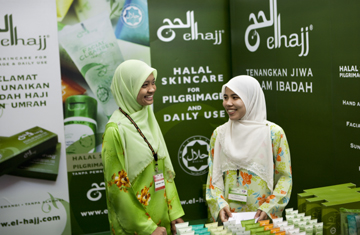
FRESH LOOK: Malaysia-based El Hajj markets skincare products such as moisturizer and facial cleanser to pilgrims headed to Mecca
Khalfan Mohammed has long been buffeted by culture shock while staying in five-star hotels. As a devout Muslim he has learned to ask staff to remove the minibar's alcohol. He loathes lobbies with loud discos and drunken guests. When traveling with his parents, it is the bikinis that rankle most. "It was quite shocking for my mother to sit in a restaurant with undressed people," the Abu Dhabi-based businessman says. "My mom and dad are not used to seeing people in public wearing their underwear." To avoid such embarrassment, the Mohammeds took to renting furnished apartments.
No longer. On a trip to Dubai last year, Mohammed stayed in the Villa Rotana, one of a growing number of hotels catering to Muslim travelers. In the lobby — all white leather, brick and glass, with a small waterfall — quiet reigns. Men in dishdashas and veiled women glide by Westerners who are sometimes discreetly reminded to respect local customs. Minibars are stocked not with alcohol, but with Red Bull, Pepsi and the malt drink Barbican. (See pictures of migrant workers in the Gulf.)
Time was, buying Muslim meant avoiding pork and alcohol and getting your meat from a halal butcher, who slaughtered in accordance with Islamic principles. But the halal food market has exploded in the past decade and is now worth an estimated $632 billion annually, according to the Halal Journal, a Kuala Lumpur-based magazine. That's about 16% of the entire global food industry. Throw in the fast-growing Islam-friendly finance sector and the myriad other products and services — cosmetics, real estate, hotels, fashion, insurance — that comply with Islamic law and the teachings of the Koran, and the sector is worth well over $1 trillion a year.
One reason for the rise of the halal economy is that the world's 1.6 billion Muslims are younger and, in some places at least, richer than ever. Seeking to tap that huge market, non-Muslim multinationals like Tesco, McDonald's and Nestlé have expanded their Muslim-friendly offerings and now control an estimated 90% of the global halal market.
At the same time, governments in Asia and the Middle East are pouring millions into efforts to become regional "halal hubs," providing tailor-made manufacturing centers and "halal logistics" — systems to maintain product purity during shipping and storage. The increased competition is changing manufacturing and supply chains in some unusual places. Most of Saudi Arabia's chicken is raised in Brazil, which means Brazilian suppliers have built elaborate halal slaughtering facilities. Abattoirs in New Zealand, the world's biggest exporter of halal lamb, have hosted delegations from Iran and Malaysia. And the Netherlands, keen to maximize Rotterdam's role as Europe's biggest port, has built halal warehouses so that imported halal goods aren't stored next to pork or alcohol.
Such arrangements cost, of course, but since the industry's anchor is food, business is booming, even in the economic crisis. "What downturn?" asks Nordin Abdullah, executive director of the Halal Journal. "You don't need your Gucci handbag, but you do need your hamburger."
Not just hamburgers. Drug companies such as the U.K.'s Principle Healthcare and Canada's Duchesnay now sell halal vitamins free of the gelatins and other animal derivatives that some Islamic scholars say make mainstream products haram, or unlawful. The Malaysia-based company Granulab produces synthetic bone graft material to avoid using animal bone, while Malaysian and Cuban scientists are collaborating on a halal meningitis vaccine.
In the Gulf, the Burooj real estate company is carving out a niche, not just because it deals exclusively with Islamic banks, but because it designs spas and swimming pools that segregate the sexes. For Muslim women concerned about skin-care products containing alcohol or lipsticks that use animal fats, a few cosmetics firms are creating halal makeup lines.
The burgeoning Islamic finance industry is using the global economic crisis to win new non-Muslim customers. Investors are attracted by Islamic banking's more conservative approach: Islamic law forbids banks from charging interest (though customers pay fees) and many scholars discourage investment in excessively leveraged companies. Though it currently accounts for just 1% of the global market, the Islamic finance industry's value is growing at around 15% a year, and could reach $4 trillion in five years, up from $500 billion today, according to a 2008 report from Moody's Investors Service.
Those who define the halal market in the traditional sense — as a matter of meat, and no more — see the industry stopping at Islamic food standards. But the movement's more bullish advocates envisage Muslim cars and halal furniture built in accordance with Muslim finance, labor and ethical principles. Citing the kosher and organic industries as successful examples of doing well by doing good, some entrepreneurs even see halal products moving into the mainstream and appealing to consumers looking for high-quality, ethical products. A few firms that comply with the Shari'a code — the religious laws that observant Muslims follow — point out that already many of their customers are non-Muslim. At the Jawhara Hotels, an alcohol-free Arabian Gulf chain run by the Islam-compliant Al Lotah conglomerate, 60% of the clientele are non-Muslims, drawn by the hotels' serenity and family-friendly atmosphere. Dutch-based company Marhaba, which sells cookies and chocolate, says a quarter of its customers are non-Muslims, mostly people concerned not about religious edicts but about food safety. "People are always looking for the next purity thing," says Mah Hussain-Gambles, founder of Saaf Pure Skincare, which markets halal makeup.
